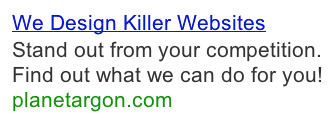I was lucky enough to be put in charge of our Adwords account earlier this year. I was a newcomer to the world of online advertising, but I was eager to learn more. I didn’t expect to find such a deep, intricate maze of data, clicks, bidding, etc. It was enough to make my head spin. I can see how there can be jobs where your only task is to manage Adwords campaigns. This is some complicated shit. Let’s take a look at what goes into an Adwords campaign.
Quality Score
One of the many factors that determines your ad placement on Google is your keyword Quality Score. The Quality Score is Google’s estimate at how relevant your keyword, ad and landing page are to potential searchers. For most of our keywords, we had pretty low Quality Scores. My first order of business was to try to increase these scores. I did this by reviewing our best keywords and making sure both the ads and landing pages contained relevant information. In some cases, I had to create new landing pages that were more specific to the keywords we were using.
It can also be helpful to create more specifically targeted Ad Groups. If you are a web design and development firm, like we are, an Ad Group for just Design is probably too broad. It is better to break that out into a few Ad Groups. Perhaps you could have a Web Design group and a Infographic Design group and so on. The more specific you get with your Ad Groups and keywords, the more success you will have with Adwords.
Keywords
What would Adwords be without the words? Your keywords are a very important component in your campaign. I started off using the broad match option for most of my keywords. That means that if you have a keyword of ‘web design’, this would get matched by searches with either ‘web’ or ‘design’ in them. I found this was way too broad and was getting some pretty weird matches that didn’t have much to do with our business. I have since switched to using more tightly controlled matching types. Currently I am using the broad match modifier, phrase match and exact match types.
The broad match modifier is formatted like ‘+ruby on +rails’. This means that a keyword phrase would need to contain both ‘ruby’ and ‘rails’, but not particularly in that order.
The phrase match is formatted like ‘ruby on rails’. For this one that phrase (or a close variation) would need to be present. ‘Ruby Jewels’ would not match here, but ‘Ruby on Rails Jewels Website’ would match.
The exact match is formatted like [ruby on rails]. This one needs a phrase that matches the keyword phrase exactly.
See what keyword matching types work best for you by trying a few out and monitoring your results.
Negative Keywords

It is a good idea to keep an eye on what keyword phrases are actually matching in your campaign. It is not enough to just look at the overall figures because you don’t know what keyword phrases triggered a click of your ad. We found some very nonsensical keyword phrases prompting clicks. Phrases like..
- snowboarding rails for sale
- where is my voicemail app located on my boost mobile lg venge
- bass pro shopping online
For each of those phrases, someone clicked an ad that lead them to our website. I don’t think these folks were looking for a Ruby on Rails web development firm, but I could be wrong. However, I did add words like snowboard, bass and voicemail to our negative keyword list. I also added words like cheap, free, classes, tutorials and such to our list. Words we don’t want in phrases to trigger our ads.
Budgets
Your only limiting factor on Adwords is your budget. The more money you are willing to spend, the more clicks and conversions you will get. We did a little experiment where we changed our budget from week to week. We would go from a $10 daily budget where we were getting 8-10 clicks a day to a $40 daily budget where we were getting 20-25 clicks a day. We eventually settled into a budget of $20 a day and it has been working out pretty well for us. We get around 12-16 clicks a day. Play around with your budget (within reason) to see what works for you.
Ads

The one way you can differentiate yourself from your competition is by writing unique ad copy. I found that most of the ads we were competing against were more or less the same. Ruby on Rails Experts or Ruby on Rails Professionals were the overwhelming majority of the headlines for a search on Ruby on Rails.
I found success in writing things a little off the norm. For example, we found the headline ‘We Design Killer Sites’ to perform much better than a more traditional approach. Find a unique way to pitch what you have to sell. Something the other companies aren’t doing. This will help your ad stand out among the me-too text ads on Google.
Keep Experimenting
The best advice I can give for working with Adwords is experiment and see what happens. Adwords works best when you are constantly fiddling and refining things as you see what works and what doesn’t work. Never stop experimenting. Have fun!
